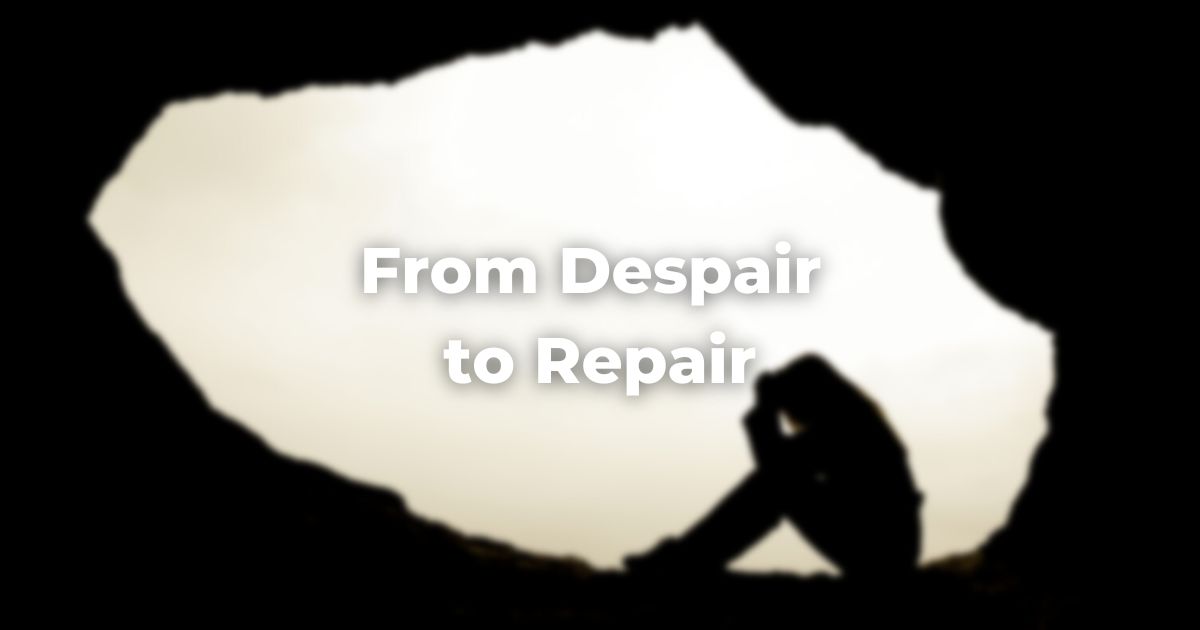In this week’s parashah we read about Judah and his daughter-in-law Tamar, who tricks him into sleeping with her after she despairs of having a child with any of his sons.
At first Judah marries off Tamar to his eldest son, Er.
But then Er is killed off by God for his wickedness, which, according to the TalmudReferring to one of two collections, the Jerusalem and Babylonian Talmuds, edited in the 6th century, that contains hundreds of years of commentary, discussion, and exploration of the ideas in the Mishnah. One could describe it as Mishnah + Gemara = Talmud Read more, refers to his refusal to inseminate Tamar lest she become pregnant and lose some of her beauty (Yevamot 34b).
Judah then marries off Tamar to his second son, Onan.
He too will not impregnate her, because according to the laws of levirate marriage, their child would bear his late older brother’s name, and he has no interest in providing offspring for his brother.
Judah instructs Tamar to wait until his third son, Shelah, is old enough to marry her, but Tamar has given up on Judah’s sons as potential fathers for the children she desires.
Instead, she dresses up as a prostitute and tricks Judah into sleeping with her, eventually giving birth to twin sons who, according to the midrashThis word is used in two ways, as both a concept and a literature. As a concept, midrash is the expansive interpretation of biblical texts. The term is used to describe the practice of rabbinic interpretation. As a text, it refers to specific collections of interpretations, particularly from the third to ninth centuries in the Land of Israel and Babylonia. Plural: Midrashim
Read more, become the progenitors of King David and the messianic line.
The story of Judah and Tamar is positioned surprisingly in the midst of the Joseph story, raising questions about why the TorahRefers to the first five books of the Hebrew Bible, the Tanakh, also called the Five Books of Moses, Pentateuch or the Hebrew equivalent, Humash. This is also called the Written Torah. The term may also refer to teachings that expound on Jewish tradition. Read more interrupted the narrative of one of Jacob’s younger sons to relay this tale about his older brother.
At the beginning of the parashah, Joseph’s brothers grow increasingly irritated by their favored younger sibling, who mocks them with his striped tunic and his self-aggrandizing dreams; when they find him alone, they sell him to Ishmaelites, who sell him to Midianites, who in turn sell him to one of Pharaoh’s stewards in Egypt.
At this point, the Torah relays the story of Judah and Tamar, before resuming the Joseph narrative with the words, “And Joseph was taken down to Egypt” (Genesis 39:1), repeating what we already know in order to remind us where the story left off.
Why does the Torah tell the story of Judah in the midst of the Joseph story, and why specifically at this moment in the narrative?
A close look at the biblical story and the midrashic commentary suggests that the Torah is teaching a lesson about the relationship between despair and repair, and between spiritual descent and the promise of redemption.
As the midrash notes (Genesis Rabbah 85:2), a key term links the story of Joseph with the story of Judah.
Just as Joseph is “brought down” to Egypt, the story of Judah is introduced with the words, “About that time Judah went down from his brothers” (Genesis 38:1). Both Joseph and Judah are being brought low, but whereas Joseph is brought down to Egypt on account of his brothers’ cruelty, Judah goes down of his own volition.
Moreover, Judah’s descent is not just physical but also spiritual; in forcing Tamar to wait in his home until allowing her to marry his third son, and then in succumbing to prostitution, he degrades himself morally, bringing himself down (Midrash Tanchuma, Vayigash 9).
Furthermore, though it is not mentioned in the midrash, the same Hebrew word for “go down” also appears two verses before the start of the story of Judah and Tamar, when Jacob sees his beloved son’s tunic covered in blood and refuses to be comforted, insisting that he will “go down” in mourning for his son to the netherworld of Sheol (Genesis 37:35).
Between the sale of Joseph, the degradation of Judah, and the grief of Jacob, each of these protagonists in the narrative of Genesis has reached a low point.
And yet as the midrash suggests, the story of Judah and Tamar is interpolated here not just because it is another low point for Jacob’s family, but also because it sows seeds of hope.
The midrash (Genesis Rabbah 85:1) quotes a verse from Jeremiah which speaks of God as the ultimate omniscient narrator: “For I know the plans I have for you, declares the Lord. Plans to prosper you and not to harm you, plans to give you hope and a future” (Jeremiah 29:11).
As the midrash goes on to explain, while the brothers were busy selling Joseph and while Judah “went down” from his brothers, God was bringing the light of the Messiah.
Furthermore, as Nir Menussi notes in his book Who is She Who Arises (Maggid 2020, Hebrew), the story of Judah and Tamar will lead to a turning point not just for the people of Israel, but for Judah as well, who was brought low even before encountering Tamar.
Although all the brothers were responsible for the sale of Joseph, Judah played a key role.
At first the brothers wished to kill Joseph, but Reuben managed to convince them instead to throw him into the pit. After Reuben had tempered his brothers’ fury, Judah riled them up again, suggesting that they sell him to the passing Ishmaelite caravan.
The rabbis argue in the midrash (Midrash Tanchuma, Vayigash 9) that Judah had tremendous sway over his brothers; had he instead told them to raise Joseph out of the pit, they would have listened to him.
In this sense, Judah’s irresponsible leadership was to blame for Joseph’s fate.
And yet in the story of Tamar, Judah learns to take responsibility for his actions and assume a more positive leadership role.
When Tamar presents Judah with the evidence that he slept with her, he elects not to deny what he has done, but rather to publicly declare, “She is more righteous than I, because I did not give her to my son Shelah” (Genesis 38:26).
Judah owns up to his mistakes, and the rabbis praise him for “sanctifying God’s name in public” (Sotah 10b). As a result of his maturation, he will now be able to assume a leadership role later in the narrative, taking responsibility for his brother Benjamin’s safe return from Egypt (Genesis 43:9) and speaking up to Joseph on behalf of all his brothers (Genesis 44:18).
From a moment of personal degradation, Judah will become the kind of leader from whom the kings of Israel descend.
In the midrash, the rabbis play on the similarity between the Torah’s terms for “descend” (yarad) and “rule” (rada)—suggesting that those experiences that bring us down also have the potential to lift us to great heights (Genesis Rabbah 8:12).
As the juxtaposition of the stories and Judah and Joseph suggests, our exaltation may emerge from our degradation, like the light of day breaking forth from the darkness of night.
See more: Parashat Vayeshev
Originally posted as part of the Conservative Yeshiva at the Fuchsberg Jerusalem Center’s Torah Sparks. Support Torah learning from the Fuchsberg Jerusalem Center/Conservative Yeshiva for leaders and seekers around the world here.
Authors
-

Ilana Kurshan teaches Talmud at the CY. She is the author of If All the Seas Were Ink (St. Martin’s Press, 2017) and Why is This Night Different From All Other Nights (Schocken, 2005). She has a degree in History of Science from Harvard and in English literature from Cambridge, and has worked in literary publishing both in New York and in Jerusalem – as a translator, a foreign rights agent, and as the Books Editor of Lilith Magazine. Since October 2020, Ilana has been a regular contributor to Torah Sparks, FJC’s weekly parashat hashavuah blog.
View all posts -



The Fuchsberg Jerusalem Center (FJC) is a home in the heart of Jerusalem where leaders and seekers can find an authentic place in Jewish tradition to call their own. FJC offers opportunities to study, pray and explore within an egalitarian and inclusive setting, creating multiple pathways for finding personal and communal meaning.
View all posts






